Hope in Action- Putting People First, the ACT Alliance’s Third Assembly in Uppsala, Sweden, will bring together representatives from ACT’s 147 member churches and agencies to fulfil its governance mandate, to set the strategy for the Alliance, and to learn, share and worship together. The Assembly will also include a joint day with the World Council of Churches’ Executive Committee focusing on “Ecumenical Diakonia and Sustainable Development”.
Assembly Advisory Group meets in Uppsala
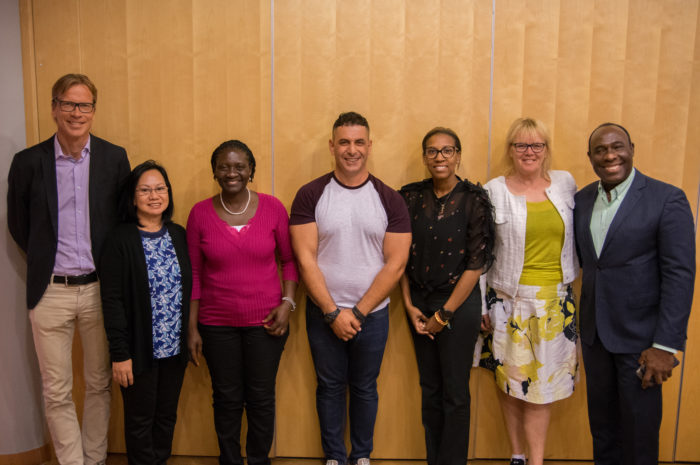
The ACT Assembly is coming soon! Last month, the Assembly Advisory Group met in Uppsala to continue their preparations for this important event in the life of the ACT Alliance. Here is the article they submitted to share the story of their work:
In late May, the ACT Assembly Advisory Group (AAG) met in Uppsala, Sweden to visit the assembly venue and discuss progress on the planning. First of all – you can look forward to arriving in Uppsala, it is a beautiful city full of charm and history. The venue for the Assembly is amazing – they have even painted the interior in the red ACT colour. We also tasted the food, a lovely lunch which, we are sure, will satisfy even the most picky Assembly attendee!
We discussed the programme and have put even more emphasis on engaging young people. So far only a few young people have registered and we call on all of our members to register a youth representative. We are aware the finances may be a problem and decided that the Secretariat should reach out to members who might be willing to contribute financially towards youth participation. We also decided that the programme itself should allow for more discussion on youth issues and involvement of all the ACT members in that discussion.
ACT Alliance is a global alliance and it is important to celebrate both our togetherness and our regional diversity. We will do this every night with exciting and innovative regional celebrations – so be prepared all of you and think big! We will be happy to assist with ideas and support the regional meetings. We would also encourage you to make plans to participate in the pre-assembly exposure day on Migration & Integration on October 27. This is an excellent opportunity for members to get involved, celebrate the work of the alliance, and to witness Hope in Action.
We also had the opportunity to look at the worship programme and we invite members to get involved! Again, it is important that all the regions will be an active part of the programme. The Cathedral is beautiful and holds the “Tree of Atonement.” When Martin Luther King was assassinated in 1968, the Rev. Martin Lönnebo (now Bishop Emeritus) took the initiative for a light tree that honored the civil rights activist’s memory. The light carrier was inaugurated at the WCC General Assembly in Uppsala in 1968 – 50 years ago – and will be used in our opening worship celebration.
The AAG are grateful to the Church of Sweden for hosting the planning meeting “Many thanks to Church of Sweden for their generous hospitality, that is simply an opportunity to show love and care” says Ihab Barakat, representing the MENA region.
From Church of Sweden’s perspective, Erik Lysén, Director of International Affairs, notes that “….. as host organisation together with Diakonia, the visit of the AAG has helped us in the preparations to make sure you will all feel welcome and for a smooth running of the Assembly. We also look forward to sharing with you the ecumenical heritage that has evolved from Uppsala over the past century, and the specific role the WCC Assembly in 1968 had in this respect.”
All in all, we discussed a lot of issues, there is much to prepare and from the AAG we would like to thank both our Swedish hosts (Church of Sweden and Diakonia) for the great work they are putting into making the assembly a success.
But remember – we are all responsible as members to make the ACT Alliance Assembly a success. So register now, get involved and prepare for an inspiring and memorable week together in Uppsala!
___________
Assembly Advisory Group:
Birgitte Qvist-Sorensen (DCA), Erik Lysén (CoS), Kerstin Kollander (CoS), Elizabeth Kisiigha (FECCLAHA), Minnie Anne Calub (NCCP), Lorenzo Mota King (SSID), Dayna Oliver (PCUSA), Ihab Barakat (DCA/NCA Palestine), Isabel Phiri (WCC).
If you have any question please contact Sarah Kambarami, ACT Assembly Planning Coordinator
Fighting for Gender Justice
ACT member Diakonia works to achieve gender equality through challenging unequal, patriarchal structures and attitudes. This work encompasses all people, irrespective of sexual orientation or gender identity.
Cycling for freedom in Bangladesh
On the International Women’s Day of 8 March 2012, ACT member Diakonia’s partner organisation Manab Kallyan Parishar (MKP) initiated a bicycle riding procession in Thakurgaon, a northern district of Bangladesh. On that day there were 150 girls and teenage students, who along with Diakonia’s partner organisation MKP rode through the roads of Thakurgaon. A total of 40 kilometres! In Bangladesh, girls usually depend on being accompanied by their brothers, fathers or male relatives wherever they need to go. By providing them with bicycles, MKP showed girls living in Thakurgaon in the northern district of the country that cycling provides a liberating experience of mobility and freedom.
Fighting violence against women in Lebanon
Poor finances and vulnerability increase the risk of forced marriage and domestic violence. These problems have accelerated in Lebanon, especially among those forced to flee from Syria. Diakonia’s partner organization ABAAD supports both Lebanese and Syrian women and informs them of their rights.
“Where Is Melissa?” moves from stage to screen
There are many victims of human trafficking, but ACT member World Association for Christian Communication (WACC) is inspiring hope for change.“Where is Melissa?” is a musical stage drama set in Jamaica, produced and directed by Kevin “Nana Moses” Calvert. It is now being turned into a film in order to reach wider audiences in both Jamaica and the Caribbean.
“Where is Melissa?” highlights the trafficking of women, girls and boys in what has become a form of modern day slavery. The production is being supported by WACC’s global program and by the Council for World Mission (CWM). The film will be used by WACC partner Women’s Media Watch (WMW Jamaica) in a nationwide advocacy campaign to be launched toward the end of 2018.
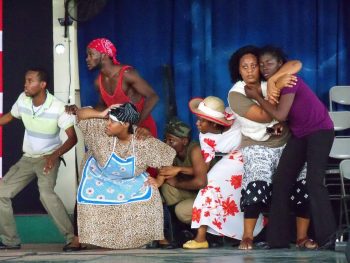
As well as policy-makers and the public, WMW Jamaica’s advocacy campaign will target schools, colleges and agencies that address gender-based violence.
According to the United Nations Office on Drugs and Crime, human trafficking includes recruiting, transporting, harbouring or receiving a person through coercion or other means for the purpose of exploitation. It is a global multi-billion dollar business.
Jamaica is one of the sources as well as a transit and destination country for women and children trafficked for the purpose of sexual exploitation and forced labour. The majority of victims are Jamaican women and girls, but young boys are increasingly being drawn into the network.
Some are trafficked from rural to urban tourist areas for commercial sexploitation. Victims are typically recruited by family members or via newspaper advertisements promoting work as spa attendants, or dancers. Jamaican children are also subject to forced labour as domestic servants.
To alert Jamaican society and policy-makers to this epidemic, Jamaican performing artists created “Where is Melissa?” – a lively musical drama about a young girl and an old village. It aims to inform and educate the public about the national and international nature of the scourge of human trafficking and to persuade them to take action to eliminate it in Jamaica.
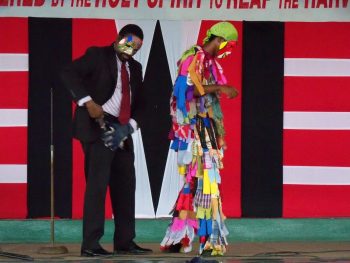
Through music, dance, drama, seminars, and film, “Where Is Melissa?” brings alive the context in which human trafficking takes place and identifies ways to help tackle it. The story takes place in the village of “Buck Up”, where a strange tree affects the lives of the villagers. In the Jamaican language, a “buck up” is an unexpected experience.
“Where is Melissa?” includes comedy, high drama, tragedy and unrequited love. It deals with a troubling matter in a way that makes of interest to all members of the community.
As a stage production, “Where is Melissa?” was seen by audiences in Jamaica. As a film, it has the potential to touch hearts and minds and to inspire hope in action throughout the Caribbean.
And with more and more people becoming aware of the trafficking of women, girls and boys in Jamaica, there is hope for a better future.
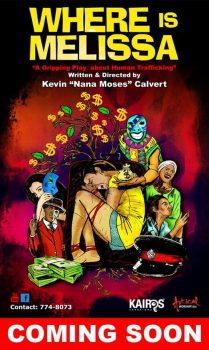
A strategy for ACT Alliance
Today I’ve just finalized the second draft of the global strategy for sharing with the Governing Board ahead of their meeting next month. This has been the completion of yet another step in ACT’s strategy revision process and reflects the input received from members, forums, advisory structures and partners gathered over the past months. It’s a key milestone and I’m excited about our direction.
The aim of the strategy revision process was to start a conversation across the Alliance regarding where we are after eight and a half years in our present format, what we’ve achieved together, what has changed in the world around us, and how our work has enabled those we seek to assist to realise their hopes and ambitions for the good of the communities and nations where they live. What is shared with the Governing Board is a reflection of these discussions and builds on our current 2015-18 Strategy Full Life and Dignity for All. What we’ve achieved to date provides the building blocks for our future.
So how is it different?
As an alliance, we’ve recognised that if we are to increase our impact we need to align to Agenda 2030 and the Sustainable Development Goals. It takes time to realise the ambitions we hope to achieve and in light of that reality we’ve increased the strategic time period from 4 to 8 years. The new strategy, Hope in Action – putting people first, runs from 2019 until 2026. This enables us to take a longer-term view and recognises that sustainable change takes time.
That said, experience has taught us that the environment in which we work changes rapidly – think shrinking space of civil society – so we need to be able to respond quickly and effectively to critical issues when we need to. The new strategy enables us to do that and we will use the 2022 General Assembly as an opportunity to reflect on impact achieved and make any mid-term adjustments in light of new realities.
Our move towards an integrated approach to humanitarian, development and advocacy work reflects the reality that these areas are inter-related. Given that, we’ve tried to articulate this in our approach and result areas for ACT’s five programmatic priorities, namely: Climate Justice, Gender Justice, Peace and Human Security, Migration and Displacement, and Emergency Preparedness and Humanitarian Response.
And there’s much more! Like the fact that, as with faith, gender equality is a key issue that we want to respond to as an alliance; that ACT forums will play a key role as central implementing structures; that we hope to see a youth movement develop as they respond – and lead us – in matters that resonate for them; that we want to be more innovative; that we know our impact will be increased through building on existing and developing new external partnerships that are aligned with our approaches and priorities.
Across the globe, substantial progress has been made in addressing issues of poverty and injustice in recent years, yet substantial challenges remain and are growing in many key areas. ACT’s message of hope is needed now more than ever – and this provides us with both a challenge and an opportunity.
The opportunity to respond and bring hope to today’s world is both immense – and during the strategy revision process what is clear is that as an alliance we want to step up. We are clear that we recognise ACT as a Christian, church-based alliance and as such we have a clear view of how we approach our work in justice, aid and development, and demonstrate Hope in Action.
So, the challenge… are we serious? Having chosen this strategic direction, are we really committed to working together as Action by Churches Together to achieve our goals? The external challenges facing individual members of ACT Alliance are real and should not be ignored. However, there are two responses to this reality. The first is for members to ‘circle the wagons’ and concentrate on advancing their own interests – the ‘America First’ approach if you will. The second, and frankly much harder response, acknowledges the reality of individual challenges facing organisations but realises that greater impact can be achieved by working together and leveraging our collective impact – and that’s what ACT is about. A stronger, more robust Alliance with members working and sharing together. Sharing the load increases the reach and impact of each member – and critically increases our collective impact for those we seek to serve.
Who is ACT Alliance? We are – all of us as members coming together because this is an imperative and a key expression of Christian faith in action – and we do so because we know that with hard work we can achieve far more by working together. The question facing each of us is, are we up for it? If so ACT Alliance can contribute to, and be a profound demonstration of, Hope in Action – putting people first.
Let’s transform the world!
We are very close to one of the most important benchmarks in the life of the ACT Alliance: its General Assembly!
Ten months ago, when I joined ACT Alliance as its General Secretary, I thought that we would have a lot of time to prepare this global gathering. Very soon I realized that this will not be a regular Assembly that will only be dealing with statutory requirements or approving policies and strategies. It will, in fact, be a prodigious moment in the life of the Alliance, which will ignite renewed commitment and engagement, new approaches, ambitious prophetic standing, and that will boldly call us to stand before the challenges that the world is putting before humanity.
During the last ten months, I have had the privilege of engaging with regional and national forums, local and global members, and connecting with different stakeholders. I was able to engage in critical conversations with members and forums on issues that are crucial to consider in a membership network. When visiting the actual work done by ACT members and forums, I immediately sensed the extraordinary experience, expertise and influence that the ACT Alliance provides, but more importantly, the potential that we have as an alliance, which we can leverage even more than we already do.
Our 3rd Assembly will be a special benchmark in the history of the ACT Alliance, because it will not only be about “business as usual”, but will transcend to a new phase, which will raise up the prophetic and political dimension of our work, associated with our Christian values to promote and fight for justice and dignity for all.
The 2018 Assembly will be a moment of celebration, for the good work done, a moment for analysing the shortcomings to ensure a coherent, relevant and effective network, and a moment to move strategically forward to position our alliance as one of the world´s largest humanitarian, development and advocacy networks.
In a polarized world, fuelled by hatred, violence and populism, we have the moral obligation to provide assistance to the most vulnerable, to express solidarity with the marginalized and excluded, and to challenge structures and root causes that undermine life with dignity.
Therefore, I see the ACT General Assembly in Uppsala as a call for full engagement in the life of the alliance, committing each of its members to work closely together for the common good. It is the “Kairos” moment, the time when conditions are right for the accomplishment of our crucial vision, an opportune and decisive moment for us not only to make a difference in the life of people, but to make transformations that will enable all people to have life, and life in abundance.
This is not an easy task, but a necessary one. ACT Alliance is well positioned to make a positive difference, building on our unique and relevant structures (national and regional forums, communities of practice, etc.), as well as on our diverse and distinctive membership (local, national, regional and international organizations).
My excitement about the positive vibes coming from the alliance is an indication that I really feel that our gathering in October/November will boost all of us to engage in this new phase of the life of the alliance. Everybody will have the conviction that we are walking in the right direction, and that we are prepared to enter into a new phase, which includes engagement with like-minded organizations and people of good faith, who want to promote an inclusive agenda that leaves no one behind.
I make a call to each of you to engage in this special moment in the life of our alliance. Let´s celebrate, let´s discern together, and let´s transform the world!
__________
Rudelmar Bueno de Faria is the General Secretary of the ACT Alliance. Previously, Rudelmar served as the World Council of Churches Representative to the United Nations in New York. He has over 25 years of experience working with national and international faith-based organizations with work-related experience in more than 85 countries.
Lerma, Colombia – from nightmare to peace
Today, there is a dusty road that passes through the little town of Lerma, Colombia. Every now and then, a horse or a few cars might pass by. People move slowly in the heat of the day. Lerma looks like a quiet town, but its history was the opposite.
In the 1980s Lerma experienced a brutal nightmare of drugs and violence. A war raged between drug syndicates and as a result a quarter of the population of Lerma were killed. The people of Lerma decided to take action to change the fate of the town and together they succeeded.
“People were scared to come here, and we were ashamed to say we came from Lerma. People thought that we didn’t respect life. In Lerma people were murdered and raped. Everybody knew that,” says Luis Alberto Gomez, one of the town’s change makers working with CIMA (Comité de El Macizo Colombiano), a partner organization of Diakonia Sweden, a member of the ACT Alliance.
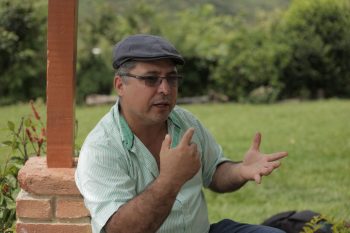
“We’ve shown that it’s possible to build peace from below and believe that the whole country can learn from us,” says Luis Alberto Gómez.
Coca bushes have been grown in Lerma on a small scale for decades. Chewing coca leaves has been a part of the culture for many years, and it also has the effect of reducing hunger. It is only when the leaves are processed chemically that they are turned into cocaine and it was only when the traders wanted to buy large quantities that its cultivation became a problem. During the 1980s, before Colombia was known to be a notorious cocaine producing country, the first drug lords operated in Lerma.
With the Coca war came money, weapons and violence. Bars opened on every street corner. Alcohol was flowing and violence escalated. Within just a few years, a quarter of the population was killed.
From Coca War to a Symbol of Peace
The survivors had enough of the violence in their town. They came together and discussed ways of dealing with the situation. Various responses were explored, including the option of a greater police and military presence. In the end, they agreed to invest in children and young people to ensure that the appropriate values were instilled in children. ACT Alliance member Diakonia and partners continue to contribute to various activities in Lerma’s transition towards peace.
“We decided to close all bars, build a school and create a thriving cultural life. Identity, leadership and a sense of belonging were our focus,” says Luis Alberto Gómez.
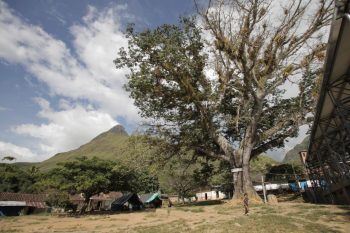
Today, Lerma has become a symbol of peace. In the middle of the town square there is a huge, 125-year-old tree. It is full of bullet holes, a memory of the nightmare in the 80s. But it is also a reminder of what Lerma is today. A sign hangs on the tree trunk that reads, ‘Here, we love life and create peace. Welcome to Lerma.’
“In Lerma, we’ve created peace from below. We’ve worked on participation and dialogue with everyone on how we want to live together. The rest of the country can learn from our experience,” says Luis Alberto Gómez.
“Peace isn’t just about ending the fighting. It’s so much more. There must be structural change. Only when children go to school, when nobody goes to bed hungry, when families have fields to farm, when there is no discrimination – only then can we say that we have real peace,” says Luis Alberto Gómez.
ACT Alliance remains in solidarity with the survivors of Lerma, and continues to work on peace-building initiatives with members around the world.
REJADH, les jeunes s’engagent !
Le Réseau des Enfants et Jeunes Africains pour les Droits Humains (REJADH) est un réseau de jeunes femmes et jeunes hommes de 13 à 30 ans issus de plusieurs pays caractérisés par des situations de conflit ou post-conflit : la République Démocratique du Congo, le Burundi, la Somalie, le Sud Soudan et le Mali. Malgré les différences culturelles, les différences religieuses, les différences de langue et la distance qui nous sépare, nous poursuivons un même rêve : l’élimination de toutes les formes de violences basées sur le genre. Dans chaque pays, nous mettons en place des stratégies et des plans d’action différents, mais le plus important c’est que nous travaillons dans une même direction.
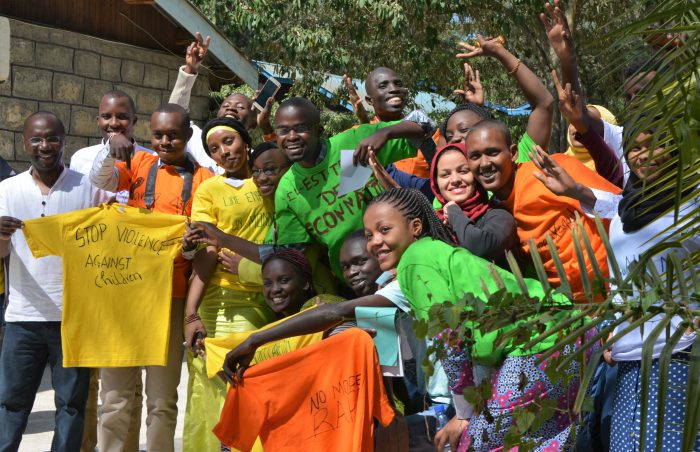 « Moi, Léontine*, je suis une fille très renfermée et toute ma famille se demandait comment la fille joviale que j’étais été devenue aigrie. J’étais perdue à cause d’un viol que j’ai subi et j’avais peur d’en parler, mais j’ai fait la rencontre d’une bonne amie qui m’a parlé de leur réseau de jeunes qui lutte contre les violences basées sur le genre. Je me souviens très bien que ce jour-là, j’ai rigolé en me disant que personne ne peut m’aider à dépasser ce que j’ai vécu, mais j’ai pris la décision de rejoindre le réseau quand même pour voir ce que ça donne. J’ai vraiment été surprise. Grâce à REJADH, aujourd’hui je redeviens petit à petit la personne que j’étais, et je peux compter sur beaucoup d’amis de plusieurs nationalités qui me donnent des conseils dès que je leur demande et sur tous les sujets. »
« Moi, Léontine*, je suis une fille très renfermée et toute ma famille se demandait comment la fille joviale que j’étais été devenue aigrie. J’étais perdue à cause d’un viol que j’ai subi et j’avais peur d’en parler, mais j’ai fait la rencontre d’une bonne amie qui m’a parlé de leur réseau de jeunes qui lutte contre les violences basées sur le genre. Je me souviens très bien que ce jour-là, j’ai rigolé en me disant que personne ne peut m’aider à dépasser ce que j’ai vécu, mais j’ai pris la décision de rejoindre le réseau quand même pour voir ce que ça donne. J’ai vraiment été surprise. Grâce à REJADH, aujourd’hui je redeviens petit à petit la personne que j’étais, et je peux compter sur beaucoup d’amis de plusieurs nationalités qui me donnent des conseils dès que je leur demande et sur tous les sujets. »
Avec le soutien de Norwegian Church Aid, membre d’ACT Alliance, d’ARIGATOU International et de Changemaker Norway, nous avons développé nos capacités en plaidoyer. Nous réfléchissons par nous-même, identifions les problèmes prioritaires et développons nos propres solutions et stratégies. Au-delà du soutien des organisations non-gouvernementales, nous puisons notre force dans les liens d’amitié, les rires et les moments partagés avec les autres membres du réseau. Plus qu’un projet, REJADH est pour nous un espace de rencontre, d’écoute et de partage. Nous les jeunes, nous sommes les leaders d’aujourd’hui, nous avons notre rôle à jouer dans le développement et la mise en œuvre des politiques, et la responsabilisation des décideurs. Chez REJADH, nous prenons ce rôle à cœur.
*Le nom a été changé pour conserver l’anonymat
______________
REJADH, youth commit !
The African Youth and Children Network for Human Rights (REJADH – French acronym) is a network bringing together young women and young men from 13 to 30 years old from various countries characterized by conflict or post conflict situations: The Democratic Republic of Congo, Burundi, Somalia, South Sudan and Mali. Despite cultural, religious and linguistic differences and the distance that separates us, we chase the same dream: the elimination of all forms of gender-based violence. In each country, we set up different strategies and action plans, but the most important is that we work in a same direction.
“I, Léontine*, I am a girl who has withdrawn, and all my family was wondering why a happy girl like me became such a bitter person. I was lost because I was raped and I was scared to talk about it, but I met a very good friend who told me about the youth network she belongs to and which addresses issues of gender-based violence. I remember very well that this day, I laughed. I was telling myself that no one can help me get over the abuse I went through, but I took the decision to join the network anyway and see where it would take me. I was very surprised. Thanks to REJADH, now I am slowly becoming the person that I used to be again, and I have plenty of friends from various nationalities who give me advice as soon as I ask them and on any topic.”
With support from ACT Alliance member Norwegian Church Aid, ARIGATOU International and Changemaker Norway, we have developed our advocacy capacities. We think critically by ourselves, we identify priority issues and we develop our own solutions and strategies. Beyond the support that we get from non-governmental organizations, we tap our strength from the friendships, laughs and shared moments with other members from the network. More than a project, REJADH is for us a safe space where we meet, listen and share. Us the youth, we are the leaders of today, we have a role to play in the development and implementation of policies and in holding accountable decision makers. At REJADH, we take this role at heart.
*the name was changed to remain anonymous
Supporting those who had to flee
The conflict in Syria has created the largest displacement crisis in well over a generation, possibly since the second world war. Six million people remain displaced internally, more than five million are registered as refugees in neighbouring countries and over a million more have fled to Europe or elsewhere.
ACT member Finn Church Aid’s (FCA) work in Jordan focuses on assisting Syrian refugees with non-formal education, vocational skills and psychosocial support. The aim is to instil hope, particularly in young people. FCA is also supporting vulnerable IDPs, returnees and refugees in Somaliland, mainly through return assistance and provision of livelihood opportunities in the reintegration process.
The videos below share some of the stories of people who are striving to survive far from their homes, finding with the ACT members the support they need to carry on.
Gender equality in Vanuatu: More than making toast
In Vanuatu, traditional gender norms and a gendered division of labour has shaped the division of labour in households for many years. ACT Alliance member UnitingWorld has engaged in various activities to enhance gender equality. In one of these activities, hope was inspired through action that challenged existing gender inequalities at the community level.
UnitingWorld, the Presbyterian Church of Vanuatu (PCV), and the Presbyterian Women’s Mission Union hosted a workshop on Gender Equality through Theology. The workshop brought together couples, family members and representatives from various organizations.
One of the workshop facilitators, Elder Martha, brought along her husband, a well-respected village leader with much local authority on the island. Elder Martha’s husband worked in the kitchen during the workshop where he prepared food and refreshments for the participants, a task which has traditionally been the responsibility of women. The leadership of Elder Martha’s husband in the food preparation process allowed Elder Martha to facilitate the workshop. This was a noteworthy moment for the participants because in Ni-Vanuatu culture, it is rare for a man to engage in household tasks, including the preparation of food.
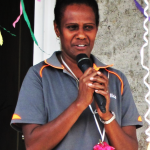 Towards the end of the week-long workshop, participants were encouraged to reflect and share on their experiences.
Towards the end of the week-long workshop, participants were encouraged to reflect and share on their experiences.
One participant expressed that while he recognised that his wife was equal to him in God’s eyes, the reality was that the division and responsibility of household tasks was not equal. In witnessing the actions of Elder Martha’s husband, he expressed that by the end of the week he was encouraged to do something that he had never done before. The participant shared that on one of the mornings that week, he woke up earlier than his wife and prepared breakfast for her and their family. His wife was given the larger portion of food which has traditionally been reserved for him as ‘head of the house’.
Many of the participants took an interest in this story. The participant’s wife commented that what might seem to be a simple action for others was representative of a revolutionary change for her.
This story is an example of how engaging faith communities to tackle the complex drivers that affect them can contribute to sustainable change. As ACT Alliance advocates for gender equality at all levels, this story heralds hope that even the smallest of actions can create a significant ripple effect towards positive change.
______________________
In-text photo credit: UnitingWorld